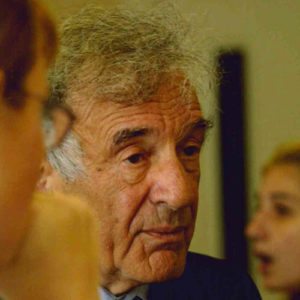Among the many people who will miss Elie Wiesel are his students. I am one of them. As a junior at Eckerd College in 2005, I had the incomparable privilege of being a student in a Winter Term course team-taught by Carolyn Johnston and Elie Wiesel. I had read Night and knew the broad strokes of Wiesel’s biography, but nothing could have prepared me for the absolute joy of spending the next three and a half weeks reading, thinking and talking about the really important things in life: friendship and faith, passion and courage, suffering and memory. The texts we read and discussed were wonderful—among them Wiesel’s Dawn and The Gates of the Forest, Nikos Kazantzakis’s Zorba the Greek and Albert Camus’s The Plague—but what really stands out now, more than a decade later, is the way Wiesel interacted with his students. He was extraordinarily kind and generous, even to those who were underprepared. He asked the most thoughtful questions, revealing a characteristically fierce intellect that was easy to overlook if you focused only on his gentle, soft-spoken manner. When others talked, he listened not only with intense interest but also great humility. In spite of, or perhaps because of, his own remarkable life, Wiesel was deeply interested in learning about other people—their stories, their fears, their hopes. I treasure the time we spent together.
He made us all want to be better students and, more importantly, better people. As a college professor, I can only wish that I were the kind of teacher to my students that Elie Wiesel was to those of us fortunate enough to sit in his classroom. He will continue to challenge and teach us, even now that he is gone, as we treasure our memories of him and share them with one another. Forgetting is not an option. As Wiesel wrote in the first volume of his memoirs, All Rivers Run to the Sea, about his motivation for writing Night, “I wrote to testify, to stop the dead from dying, to justify my own survival. I wrote to speak to those who were gone. As long as I spoke to them, they would live on, at least in my memory.” I am sad that Elie Wiesel is no longer among us, but his legacy will live on in the written words he left behind and in our memories.
—Randy M. Browne ’06


